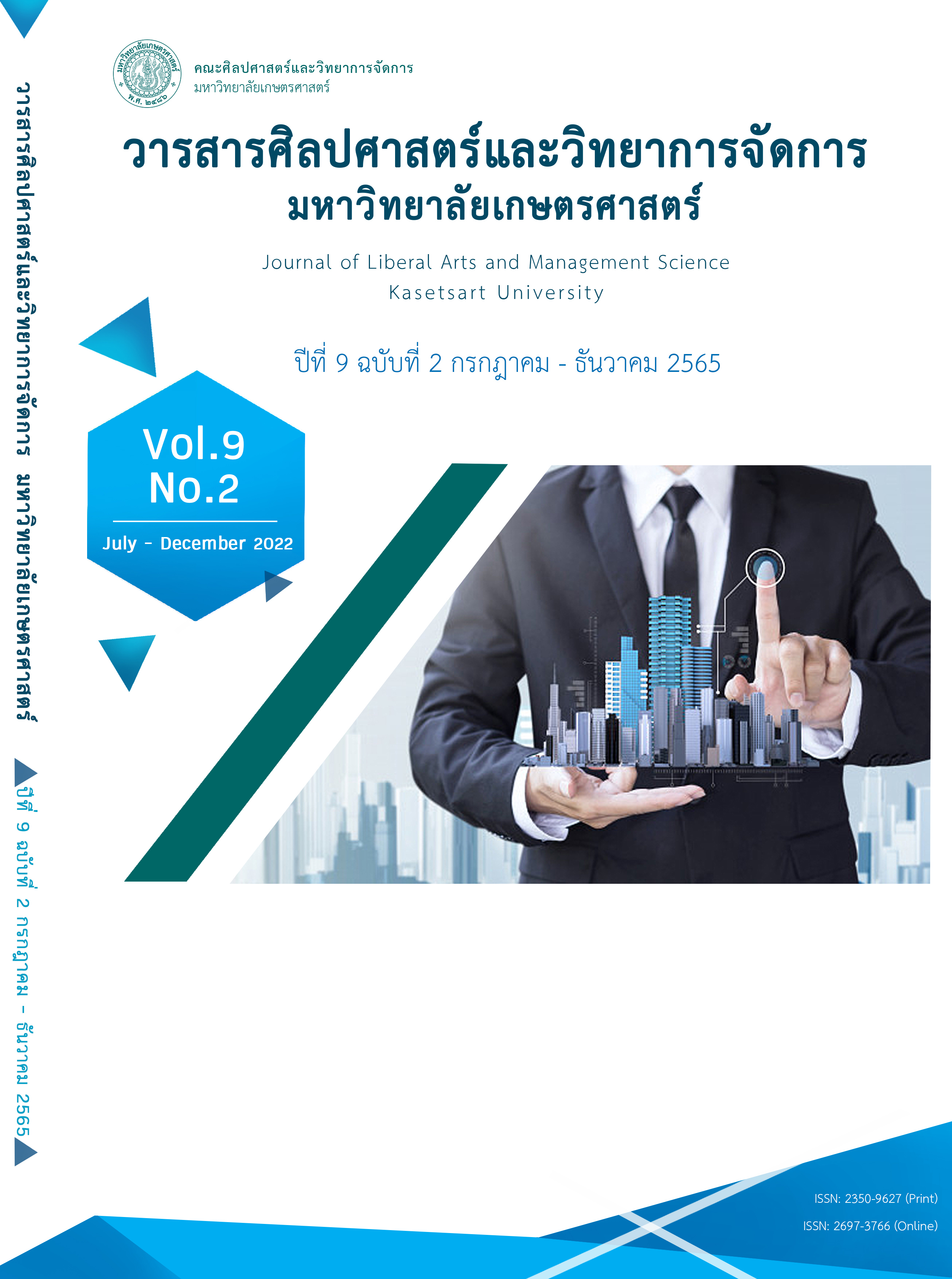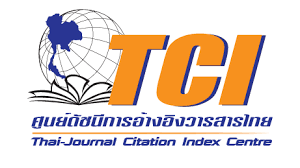การเปรียบเทียบลักษณะพฤติกรรมของผู้บริหารในการบิดเบือนข้อมูลทางบัญชีของกลุ่มบริษัทจดทะเบียนที่ถูกและไม่ถูกสำนักงาน ก.ล.ต. สั่งให้แก้ไข งบการเงินและตรวจสอบเป็นกรณีพิเศษ
คำสำคัญ:
การตกแต่งกำไร, การบิดเบือนข้อมูลทางบัญชี, การตรวจสอบกรณีพิเศษบทคัดย่อ
งานวิจัยนี้เพื่อวิเคราะห์เปรียบเทียบความแตกต่าง และศึกษารูปแบบพฤติกรรมของผู้บริหารในการบิดเบือนข้อมูลทางบัญชีของกลุ่มบริษัทจดทะเบียนที่ถูกและไม่ถูกสำนักงาน ก.ล.ต. มีคำสั่งให้แก้ไขงบการเงินและตรวจสอบเป็นกรณีพิเศษ จำนวน 68 ตัวอย่าง โดยใช้ข้อมูลตั้งแต่ปีพ.ศ. 2554 ถึง พ.ศ. 2563 และทำการวิเคราะห์ข้อมูลทางสถิติ ผลการวิจัยพบว่า 1) ผู้บริหารกลุ่มบริษัทที่ถูกสำนักงาน ก.ล.ต. มีคำสั่งให้แก้ไขงบการเงินและตรวจสอบเป็นกรณีพิเศษมีการฝ่าฝืนเงื่อนไขทางการเงินมากกว่าและแตกต่างกันกับผู้บริหารกลุ่มบริษัทที่ไม่ถูกสำนักงาน ก.ล.ต. มีคำสั่งให้แก้ไขงบการเงินและตรวจสอบเป็นกรณีพิเศษอย่างมีนัยสำคัญทางสถิติที่ระดับความเชื่อมั่นร้อยละ 99.9 และ 95 2) ผู้บริหารของกลุ่มบริษัทที่ถูกสำนักงาน ก.ล.ต. มีคำสั่งให้แก้ไขงบการเงินและมีการตรวจสอบเป็นกรณีพิเศษมีพฤติกรรมการบิดเบือนข้อมูลทางบัญชีไม่แตกต่างกัน เมื่อทำการวิเคราะห์เชิงเนื้อหาร่วมกับประเด็นข่าวของสำนักงาน ก.ล.ต. พบว่า ผู้บริหารส่วนใหญ่มีพฤติกรรมในการบิดเบือนข้อมูลทางบัญชีเป็นไปในทิศทางเดียวกัน 3) ลักษณะพฤติกรรมของการบิดเบือนข้อมูล ทางบัญชี ประกอบด้วย 3 องค์ประกอบ คือ เจตนาของผู้บริหาร การฝ่าฝืนเงื่อนไขทางการเงิน และผลประโยชน์ของผู้บริหาร ซึ่งประโยชน์ที่ได้รับจากงานวิจัยนี้ คือ การนำเสนอลักษณะพฤติกรรมของผู้บริหารในการบิดเบือนข้อมูลทางบัญชี
##plugins.generic.usageStats.downloads##
เอกสารอ้างอิง
ธเรศ สันติวงศ์ไชย. (2565). รายงานการเงินและการวิเคราะห์. กรุงเทพมหานคร: บริษัทแอคทีฟ พริ้นท์ จำกัด.
นฤดมกุล พรชัย และพรรณนิภา รอดวรรณะ. (2554). การทุจริตของพนักงานในองค์กรธุรกิจ. จุฬาลงกรณ์ธุรกิจปริทัศน์, 30(130), 1-11.
ศรายุทธ เรืองสุวรรณ. (2565). ความรู้เบื้องต้นเกี่ยวกับการตกแต่งกำไร. สมุทรสาคร: บริษัท แปลนพริ้นท์ติ้ง จำกัด.
ศรายุทร เรืองสุวรรณ และสุภาวินี จีระสุวรรณ. (2564). สัญญาณเตือนภัยล่วงหน้ากับการตกแต่งกำไร: บทเรียนจากบริษัทที่ละเมิดหลักการบัญชีที่รับรองทั่วไป. วารสารวิชาชีพบัญชี, 17(53), 7-20.
สำนักงานคณะกรรมการกำกับหลักทรัพย์และตลาดหลักทรัพย์. (2565ก). ข่าว ก.ล.ต.. สืบค้นเมื่อ 21 พฤศจิกายน 2565, จาก https://www.sec.or.th/TH/Pages/News_LISTVIEW.aspx
สำนักงานคณะกรรมการกำกับหลักทรัพย์และตลาดหลักทรัพย์. (2565ข). สถิติการกล่าวโทษและเปรียบเทียบ 2556-2565. สืบค้นเมื่อ 21 พฤศจิกายน 2565, จาก http://kalasin.m-society.go.th.
สำนักงานคณะกรรมการกำกับหลักทรัพย์และตลาดหลักทรัพย์. (2565ค). งบการเงินที่อยู่ระหว่างการแก้ไข.สืบค้นเมื่อ 21 พฤศจิกายน 2565, จาก https://www.sec.or.th/TH/Pages/News_ LISTVIEW.aspx
สำนักงานคณะกรรมการกำกับหลักทรัพย์และตลาดหลักทรัพย์. (2565ง). ข้อมูลรายบริษัท/หลักทรัพย์. สืบค้นเมื่อ 21 พฤศจิกายน 2565, จาก https://classic.set.or.th/set/commonslookup.do? language=th&country=TH
Alissa, W., Bonsall Iv, S. B., Koharki, K., & Penn Jr, M. W. (2013). Firms' use of accounting discretion to influence their credit ratings. Journal of Accounting and Economics, 55(2-3), 129-147.
Almashaqbeh, A. A., Abdul-Jabbar, H., & Shaari, H. (2018). Real earnings management and tax considerations: A conceptual analysis. International Journal of Business Management and Commerce, 3(2), 25-36.
Atwood, T. J., Drake, M. S., & Myers, L. A. (2010). Book-tax conformity, earnings persistence and the association between earnings and future cash flows. Journal of Accounting and Economics, 50(1), 111-125.
Baccouche, S., Hadriche, M., & Omri, A. (2013). The impact of audit committee multiple-directorships on earnings management: evidence from France. Journal of Applied Business Research (JABR), 29(5), 1333-1342.
Balsam, S., Irani, A. J., & Yin, Q. J. (2012). Impact of job complexity and performance on CFO compensation. Accounting Horizons, 26(3), 395-416.
Carter, K. E. (2015). The joint effect of the sarbanes-oxley act and earnings management on credit ratings. Journal of Accounting and Finance, 15(4), 77.
Cheng, Q., & Warfield, T. D. (2005). Equity incentives and earnings management. The accounting review, 80(2), 441-476.
Cohen, D. A., & Zarowin, P. (2010). Accrual-based and real earnings management activities around seasoned equity offerings. Journal of accounting and Economics, 50(1), 2-19.
Coppens, L., & Peek, E. (2005). An analysis of earnings management by European private firms. Journal of International Accounting, Auditing and Taxation, 14(1), 1-17.
Cormier, D., Houle, S., & Ledoux, M. J. (2013). The incidence of earnings management on information asymmetry in an uncertain environment: Some Canadian evidence. Journal of International Accounting, Auditing and Taxation, 22(1), 26-38.
Costello, A. M. & Wittenberg-Moerman, R. (2011). The impact of financial reporting quality on debt contracting: Evidence from internal control weakness reports. Journal of Accounting Research, 49(1), 97-136.
Dichev, I. D., Graham, J. R., Harvey, C. R., & Rajgopal, S. (2013). Earnings quality: Evidence from the field. Journal of accounting and economics, 56(2-3), 1-33.
Cressey, D. R. (1970). Organized crime and inner-city youth. Crime & Delinquency, 16(2), 129-138.
Duong L., & Evans J. (2015). CFO Compensation: Evidence from Australia. Pacific basin Finance Journal, 35(PA), 425-443.
Fama, E. F., & Jensen, M. C. (1983). Separation of ownership and control. The journal of law and Economics, 26(2), 301-325.
Frydman, C., & Saks, R. E. (2010). Executive compensation: A new view from a long-term perspective, 1936–2005. The Review of Financial Studies, 23(5), 2099-2138.
Goncharow, I., & Zimmermann, J. (2006). Earnings management when incentives compete: the role of tax accounting in Russia. Journal of International Accounting Research, 5(1), 41-65.
Graham, J. R., Harvey, C. R., & Rajgopal, S. (2005). The economic implications of corporate financial reporting. Journal of accounting and economics, 40(1-3), 3-73.
Ifada, L. M. & Wulandari, N. (2015). The effect of deferred tax and tax planning toward earnings management practice (empirical study on non-manufacturing companies listed in Indonesia Stock Exchange in the period of 2008-2012. International Journal of Organizational Innovation, 8(1), 352-380.
Jensen, M. C., & Meckling, W. H. (1976). Theory of the firm: Managerial behavior, agency costs, and ownership structure. Journal of Financial Economics, 3(1976), 305-360.
Jones, J. J. (1991). Earnings management during import relief investigations. Journal of accounting research, 29(2), 193-228.
Kuč, V., & Kaličanin, Đ. (2021). Determinants of the capital structure of large companies: Evidence from Serbia. Economic Research-Ekonomska Istraživanja, 34(1), 590-607. https://doi.org/10.1080/1331677X.2020.1801484
Maslow, A. (1970). Motivation and Personality. New York: Harper and Row.
Meek, G. K., Rao, R. P., & Skousen, C. J. (2007). Evidence on factors affecting the relationship between CEO stock option compensation and earnings management. Review of accounting and finance, 6(3), 304-323.
Nalarreason, K. M., Sutrisno, T., & Mardiati, E. (2019). Impact of leverage and firm size on earnings management in Indonesia. International Journal of Multicultural and Multireligious Understanding, 6(1), 19-24.
Nam, H. J., Choi, J. H., Comprix, J., & Kwon, H. H. (2012). Firm location and earnings management: Korean evidence. Asia-Pacific Journal of Accounting & Economics, 19(3), 292-317.
Ngamchom, N. (2018). Opportunistic or beneficial earnings management of good corporate governance score enterprises in Thailand. Thailand and The World Economy, 36(2), 52-78.
Nursetya, R. P., & Hidayati, L. N. (2020). How does firm size and capital structure affect firm value?. Journal of Management and Entrepreneurship Research, 1(2), 67-76.
Hart, O. D. 1988). Incomplete Contracts and the Theory of the Firm. Journal of Law, Economics and Organization, 4(1), 119-139.
Panda, B., & Leepsa, N. M. (2017). Agency theory: Review of theory and evidence on problems and perspectives. Indian Journal of Corporate Governance, 10(1), 74-95.
Roychowdhury, S. (2006). Earnings management through real activities manipulation. Journal of Accounting and Economics, 42(3), 335-370.
Sari, D. K., Utama, S., & Rossieta, H. (2017). Tax avoidance, related party transactions, corporate governance and the corporate cash dividend policy. Journal of Indonesian Economy and Business: JIEB., 32(3), 190-208.
Shuto, A. (2007). Executive compensation and earnings management: Empirical evidence from Japan. Journal of International Accounting, Auditing and Taxation, 16(1), 1-26.
Singleton, T. W., & Singleton, A. J. (2010). Fraud auditing and forensic accounting (Vol. 11). New York: John Wiley & Sons.
Sirait, F., & Siregar, S. V. (2014). Dividend payment and earnings quality: evidence from Indonesia. International Journal of Accounting and Information Management, 22(2), 103-117.
Trombetta, M., & Imperatore, C. (2014). The dynamic of financial crises and its non-monotonic effects on earnings quality. Journal of Accounting and Public Policy, 33(3), 205-232.
Turner, M. J., & Guilding, C. (2011). An investigation of the motivation of hotel owners and operators to engage in earnings management. Qualitative Research in Accounting and Management, 8(4), 358–381.
Watts, R. & Zimmerman J. (1986). Positive Accounting Theory. Prentice-Hall: Englewood Cliffs, NJ.
Zang, A. Y. (2012). Evidence on the trade-off between real activities manipulation and accruals-based earnings management. The Accounting Review, 87(2), 675-703.









